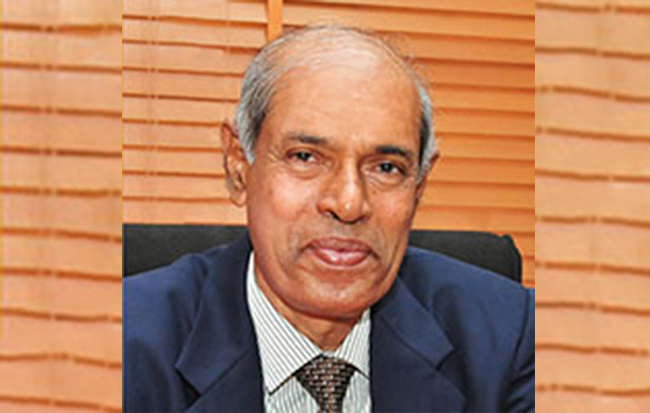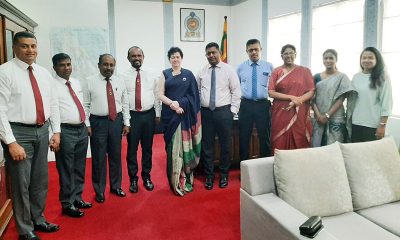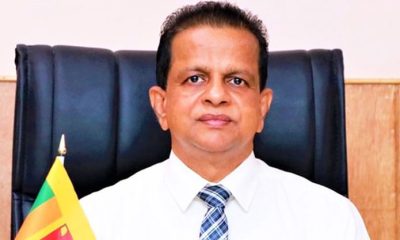News
As micro, small and medium enterprises bear brunt of COVID and economic crisis more than million workers go abroad

The unofficial number of Lankan workers migrating for jobs abroad may by now be more than a million, Prof. Sunil Chandrasiri, senior professor of economics at the University of Colombo and one of the authors of International Labour Organization’s report on ”Impact of multiple economic crises on Sri Lanka’s micro, small and medium enterprises” which was published recently.
“The Government estimates that roughly 73,000 jobs were lost. But the actual loss of jobs is likely several times higher. A total of 311,000 Sri Lankans left the country for foreign employment in 2022, according to official figures registered with the Foreign Employment Bureau. Moreover, 874,955 passports were issued that year suggesting that the unofficial number of workers migrating out of the country may by now be more than a million. The crises exacerbated long-felt skills deficits while doubling the poverty rate; and a quarter of all Sri Lankans are likely to remain poor over the next few years,” he said.
The COVID-19 pandemic severely or very severely impacted the business operations of nearly 80 percent of Sri Lankan micro, small and medium enterprises (MSMEs), while the economic crisis of 2022 impacted 89 percent of them, he said.
According to Prof. Chandrasiri his study looked at 521 MSMEs that had survived the twin crises and 50 MSMEs that did not survive them. The surveys and interviews were conducted between January and March 2023 in 10 districts, he said.
He added that micro, small and medium scale enterprises employ about 75 percent of the country’s workers.
“About 21 percent employed in micro scale enterprises have lost their jobs in the last few years due to the economic crisis and Covid. 23 percent and 22 percent of employees of small and medium scale enterprises have lost their jobs respectively,” he said.
Skilled workers, unskilled workers as well as those at executive levels, too, have lost jobs, Prof. Chandrasiri said.
Nearly half of all the surviving firms found it difficult to retain or hire people because they could not pay enough to cover the rising living costs. “Most entrepreneurs claim that they are not able to pay a salary that matches the cost of living. A lot of people have migrated,” he said.
There is also migration within the country, he said. A large number of workers from the villages, working in towns, have returned home voluntarily because they can’t sustain themselves in the towns. The cost of living is lower in the villages and these workers try to find work near their homes, he said.
“On the other hand small and medium entrepreneurs claim that electricity and water bills, as well as loan repayments, are about 80 percent of their expenditure. They are also troubled by taxes that have increased the cost of their products. The end user can’t afford the prices of goods and services and thus have dramatically reduced consumption,” he said.
By subsector, the impact of the multiple crises was severe on MSMEs in the tourism, manufacturing, construction, transport and storage, wholesale and retail trade and other services. At the national level, these sub sectors account for more than 55 percent of GDP.
Continuing low employee morale and low productivity are likely to hamper recovery. The crises left in their wake high levels of indebtedness, which will impede the continued survival and growth of MSMEs. About 42 percent of the surviving MSME proprietors reported that they were at risk of failure within a year, he said.
Given below are highlights from the study: “The surviving MSMEs displayed more adaptive behaviours, such as using digital technologies for business operations (38 percent), sourcing from new suppliers (38 percent), introducing flexible work practices (39 percent), adjusting the product or service mix to the labour that was available (39 percent), using online sales and social media to market products (32 percent) and rescheduling bank loans (36 percent).
“In contrast, proprietors of MSMEs that had closed reported more passive behaviours, such as laying off workers (39 percent), reducing working hours (38 percent), borrowing money from other sources (43 percent) and liquidating assets (46 percent). Relatively more non-surviving firms reduced workers’ salaries (at 30 percent of enterprises) than the surviving MSMEs (at 20 percent).
“In terms of dynamic capabilities, the surviving MSMEs responded proactively to the uncertain and changing business environment in the country. For example, 83 percent of them cut costs and eliminated waste; 71 percent improved customer services; 60 percent identified new customers; and 58 percent improved employee safety and welfare facilities.
“Many surviving MSMEs resorted to digitalization in their adaptive behaviour, but the digital strategies they adopted were at the low end of the digitalization scale, such as using social media platforms mainly for information search.
“Resilience emerged as an entrepreneurial skill that enabled enterprises to adapt and grow stronger in the face of challenges.
“The study identified entrepreneurial orientation, technological adaptation, factor substitution, minimizing waste and searching for new markets as the primary resilience factors. Different actors in the MSME ecosystem should include these topics in training programmes for training providers, policymakers and private and nongovernmental organizations.
“The overwhelming majority of MSMEs did not receive any support from institutions dedicated to supporting MSME development and instead struggled or closed on their own.
“Although the COVID-19 stimulus packages offered by the Sri Lankan Government to affected individuals and MSMEs was much smaller than what was offered in other countries in the region, these, too, seemed to have bypassed most of the MSMEs. Political affiliation and influence appear to have had a hand in who was able to access the support.
Financial institutions also dedicated to supporting MSMEs seemed to have offered little financial support to them by restructuring loans, etc. during the economic crisis, even though they posted substantial profits while the economy contracted.”
News
US sports envoys to Lanka to champion youth development

The U.S. Embassy in Colombo welcomed the U.S. Sports Envoys to Sri Lanka, former National Basketball Association (NBA) and Women’s National Basketball Association (WNBA) players Stephen Howard and Astou Ndiaye, from June 8 through 14.
The Public Diplomacy section of the U.S. Embassy said that it would launch a weeklong basketball program intended to harness the unifying power of sports, made possible through collaboration with Foundation of Goodness and IImpact Hoop Lab.
While in Sri Lanka, Howard and Ndiaye, both retired professional basketball players, will conduct a weeklong program, Hoops for Hope: Bridging Borders through Basketball. The Sports Envoys will lead basketball clinics and exhibition matches and engage in leadership sessions in Colombo and Southern Province for youth aged 14-18 from Northern, Uva, Eastern and Western Provinces, offering skills and leadership training both on and off the court. The U.S. Envoys will also share their expertise with the Sri Lanka Basketball Federation, national coaches, and players, furthering the development of basketball in the country. Beyond the clinics, they will collaborate with Sri Lankan schoolchildren to take part in a community service project in the Colombo area.
“We are so proud to welcome Stephen and Astou as our Sports Envoys to Sri Lanka, to build on the strong people-to-people connections between the United States and Sri Lanka,” said U.S. Ambassador Julie Chung. “The lessons that will be shared by our Sports Envoys – communication, teamwork, resilience, inclusion, and conflict resolution – are essential for leadership development, community building, equality, and peace. The U.S. Sports Envoy program is a testament to our belief that sports can be a powerful tool in promoting peace and unity.”
News
Rahuman questions sudden cancellation of leave of CEB employees

SJB Colombo District MP Mujibur Rahuman in parliament demanded to know from the government the reasons for CEB suspending the leave of all its employees until further notice from Thursday.
MP Rahuman said that the CEB has got an acting General Manager anew and the latter yesterday morning issued a circular suspending leave of all CEB employees with immediate effect until further notice.
“We demand that Minister Kanchana Wijesekera should explain this to the House. This circular was issued while this debate on the new Electricity Amendment Bill was pending. There are many who oppose this Bill. The Minister must tell parliament the reason for the urge to cancel the leave of CEB employees,” the MP said.However, Speaker Mahinda Yapa Abeywardena prevented Minister Wijesekera responding to the query and said that the matter raised by MP Rahuman was not relevant.
News
CIPM successfully concludes 8th Annual Symposium

The Chartered Institute of Personnel Management (CIPM) successfully concluded the 8th Annual CIPM Symposium, which took place on 31st May 2024. Themed “Nurturing the Human Element—Redefining HRM in a Rapidly Changing World,” the symposium underscored the pivotal role of human resource management (HRM) in today’s dynamic global landscape. Since its inception in 1959, CIPM has been dedicated to advancing the HR profession through education, professional development, and advocacy, solidifying its position as Sri Lanka’s leading professional body for HRM.
Ken Vijayakumar, the President of the CIPM, graced the occasion as the chief guest. The symposium commenced with the welcome address by the Chairperson, Prof. Arosha Adikaram, followed by the Web Launch of the Symposium Proceedings and Abstract Book by the CIPM President. The event featured distinguished addresses, including a speech by Chief Guest Ken Vijayakumar, President of CIPM, and an address by Guest of Honor Shakthi Ranatunga, Chief Operating Officer of MAS Holdings Pvt. Ltd., Sri Lanka.
The symposium also featured an inspiring keynote address by Prof. Mario Fernando, Professor of Management and Director of the Centre for Cross Cultural Management (CCCM) at the University of Wollongong, Australia.
Vote of Thanks of the inauguration session was delivered by Dr. Dillanjani Weeratunga, Symposium Co-chair.
The symposium served as a comprehensive platform for researchers to present their findings across a wide range of critical topics in HRM. These included Cultural Diversity and Inclusion, Talent Development and Retention, Ethical Leadership and Corporate Social Responsibility, Adapting to Technological Advancements, Mental Health and Well-being at Work, Global Workforce Challenges, Employee Empowerment, and Reskilling and Upskilling.
The plenary session was led by Prof. Wasantha Rajapakse. Certificates were awarded to the best paper presenters during the valedictory session, followed by a vote of thanks delivered by Kamani Perera, Manager of Research and Development.
The annual symposium of CIPM was a truly inclusive event, attracting a diverse audience that spanned undergraduates, graduates, working professionals, research scholars and lecturers. This widespread interest highlights the symposium’s significance in the field of HRM, offering a unique opportunity for everyone to network and learn from scholarly brains.The CIPM International Research Symposium was sponsored by Hambantota International Port, Sri Lanka Institute of Information Technology (SLIIT), E B Creasy & Co. PLC, and Print Xcel Company.
























